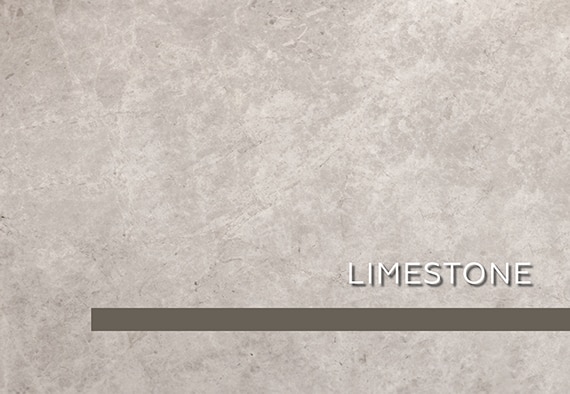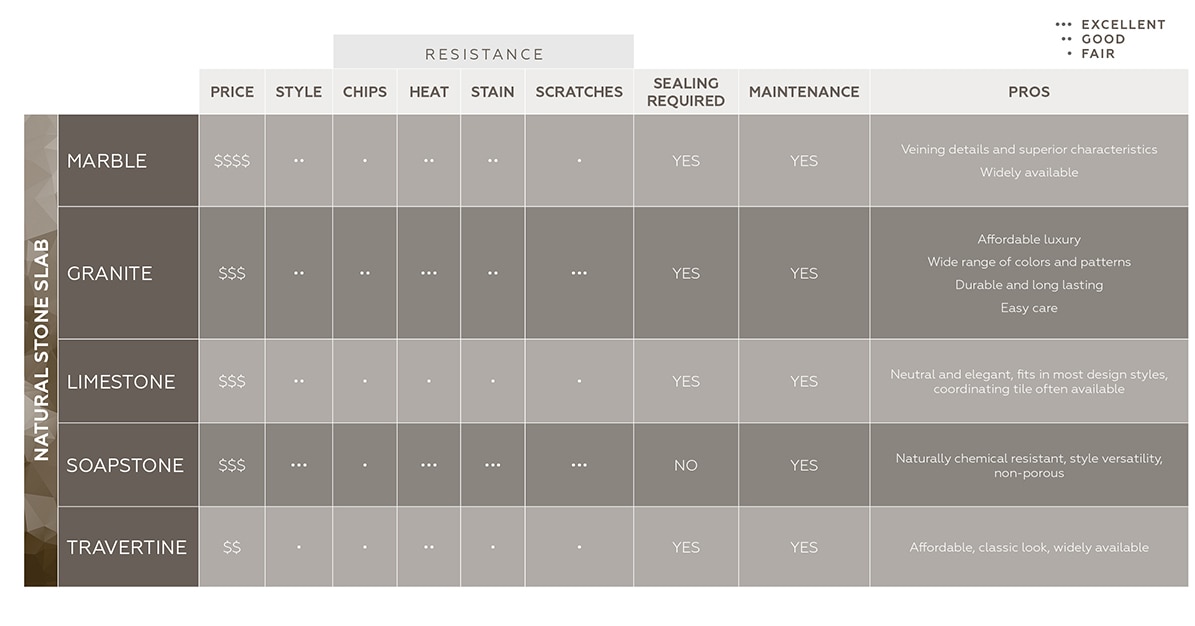Masterpieces only nature could create
Formed through years of subterranean heat and pressure, natural stone boasts extraordinary beauty and strength. Unearthed from quarries around the world, Daltile selects only the finest quality stone to offer you this unrivaled selection. Since natural stone is mined, each one is completely unique. Heat, fire, scratch, chip, and stain resistant, with the proper care, natural stone can last a lifetime. From kitchen countertops to bathroom vanities, a natural stone countertop can transform your surface into a one-of-a-kind masterpiece.
BROWSE BY SERIES
FEATURED BENEFITS
NATURAL STONE SLAB FAQS
-
What is the difference between natural stone and manufactured stone?
Manufactured stone is man-made. Natural stone is created when one or more minerals consolidate into a solid formation, creating a stone block, by natural processes.
To make countertops, the stone blocks are removed from the quarry, cut into 2cm and 3cm slabs, and polished. Skillful blending or matching of the dimension stone blocks, veneer panels, and tops, results in a beautiful blending of nature's variety and man's design. In contrast to the uniformity of materials produced by machine or assembly line, stone's naturally varied appearance has spectacular character. Each slab is unique.
-
What is the best natural stone for countertops?The "best" countertop is the one that you find most appealing and fulfills your needs. For countertops likely to be subjected to heavy use, we recommend quartzite or granite, as they are the strongest natural stone. If you find marble, limestone, travertine or other natural stone more attractive, do not hesitate to select them. All are durable enough to withstand the demands put on most countertops.
-
What is the strongest natural stone?Diamonds, of course. But covering your surface with diamonds is most likely not an option. Of stone countertop options, quartzite and granite are the hardest stone. Ranking as an 7 on the Mohs scale, quartzite is most resistant to stains, scratches, etching, cracking, and other types of damage. Granite follows closely behind with a 7-6 ranking (6.5 average).
-
How much material should I order for my project?
Measure the area you would like to cover carefully. Take wastage into account to ensure you will have enough material to complete the project.
Also, keep in mind that the material from a quarry today may be different from what was available six months ago or will be available in the future. Additionally, there may be more than one quarry of the material. It is always recommended to include “attic stock,” which is a small amount of material - approximately 10% extra - to be stored in the event future repairs are needed.
-
How do I clean my natural stone countertops?
Clean natural stone surfaces with a neutral pH stone cleaner (which are available at many retail stores and tile and stone dealers) or a mild liquid dish-washing detergent and warm water. Use a clean, soft cloth for best results. Rinse the surface thoroughly and dry with a soft cloth. Visit our natural stone care and maintenance section to learn more.
Quick tips:
• Do not use scouring powders or creams; these products contain abrasives that may scratch the surface.
• Do not use products that contain lemon, vinegar or other acids on marble or limestone.
• Too much cleaner or soap may leave a film and cause streaks.
-
How do I prevent staining on natural stone?
Most natural stones are porous and readily absorb liquids and moisture. The use of a sealer will help prevent staining in most situations, but spills should be wiped up as soon as possible. Even a sealed surface can stain if left in contact with a staining agent for a long period of time.
We also recommend using trivets, coasters, or napkins when serving food or drinks on a stone countertop. Soft drinks, coffee, tea and fruit juices contain mild acids and can etch the polished surface of a stone and stain quite rapidly. These should be cleaned off immediately with mild soap and warm water.
-
What is a stone sealer?
Sealers cure as a film on your natural stone countertop. Since the material is actually covering the stone, the appearance of the surface may be altered. The sealer will absorb most of the wear on the countertop. Since it is softer than the stone, normal use of the countertop will result in abrasion of the sealer surface and require periodic reapplication to maintain its original luster. A properly applied topical sealer will normally reduce, although not eliminate, the vulnerability of calcareous stones from mildly acidic solutions.
General Precautions: When any surface protection product is used, care must be taken to read and follow the manufacturer's instructions accurately. This will provide the greatest benefit from the application and will guarantee safe handling of the product.














